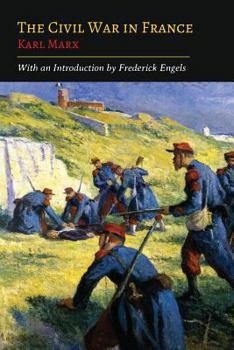Book Overview
Wellred edition featuring a new introduction providing the historical background to the Paris Commune, as well as Engels' 1891 introduction and articles by Lenin and Trotsky."Working men's Paris, with... This description may be from another edition of this product.
Format:Paperback
Language:English
ISBN:1614276048
ISBN13:9781614276043
Release Date:March 2014
Publisher:Martino Fine Books
Length:148 Pages
Weight:0.75 lbs.
Dimensions:0.3" x 6.0" x 9.0"
Customer Reviews
3 ratings
Interesting but has its limit
Published by Thriftbooks.com User , 16 years ago
I read it since recently I finished reading several books deal with The second empire, Fraco-Prussia war and Paris. Yes, I needed some alternative opinion on the Commune.Each invective Marx pours at Thiers, Napoleon III and corrupted Bourgeoisie is penetrating. Especially his opinion on Bismarck and how he helped to put down Paris Commune shows Marx's brilliance evaluation of the international relationship and political current that apparently stemmed the tide of the revolution. The polemic conveyed by Marx is lucid and spellbouding as usual and it is not doubtful that Marx actually respected the courage of Parisians who revolted against the corrupted regime of little Napoleon in spite of the fact that there are only handful of follwers of Marx and majority of Communards were followers of Proudhon and Blanqui. My complaints is that majority of French people at that time were not proletarians and the rural populations were generally hostile to Communards.therefore , Marx's hypothesis of taking Versaille by storm was not completely feasible. Lenin's disparagement on Plekhanov can be revoked by same logic. Could the revolution of 1905 topple Czarist regime? It's highly doubtful.
Stands the Test of Time
Published by Thriftbooks.com User , 19 years ago
The most masterful political examination in understanding the working of state power and the state apparatus that reinforces control over the working class and popular movements. Marx's work is visionary as he depicts the foundation of state power in anachronistic but powerful forces in civil society that began under the monarchical system of rule. So much of this work is relevant to twenty-first century politics as the remnants of older regimes stymie the development of a broader class-based movement of working people. The residual system of fudalism sets back class struggles as do the ever-present penchant for state support for the ruling class that is unrelenting under capitalism. The democratic road to socialism is clearly on the horizon, but even as socialist democracy takes its roots, it is the capitalist system that undermines the programs through utiizing military and political force to defend its class interest. So we are indeed back at square one--can the bourgeois democratic regime be reformed or must it be overthrown. State repression is in itself undemocratic as is the capitalist process of labor relations that create class antagonisms that give rise to moves for popular democracy at work and in the community. Indeed it is the ruling class that is found to be anti-democratic--but finds ample use of democratic language to reinforce its ideological power. Even before there is a debate between Bernstein and Lenin, we are treated to how state power--inured with the guise of democracy--represses workers and peasants--and is in fact the bastion for plutocratic control over society. Marx's CIVIL WAR IN FRANCE: THE PARIS COMMUNE stands the test of time and is a crucial source for understanding the staying-power of repressive bourgeois governments in the face of neoliberalism and crackdown against popular forces.
Nowadays...
Published by Thriftbooks.com User , 21 years ago
it is still a current reality. It happened in Spain in 1930's and now in the XXI century in this all-over-the-world fight against neoliberalism!At the end of the day it only remains a fight between us against them, us against the rich ones.






